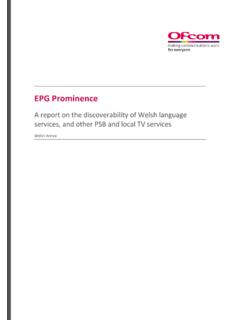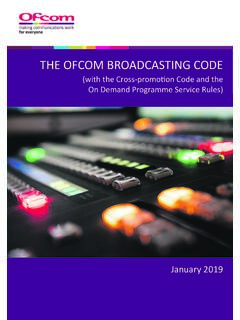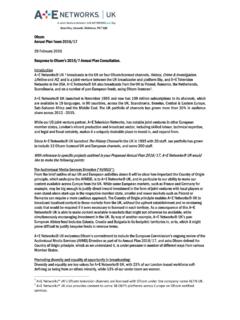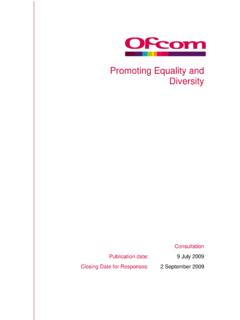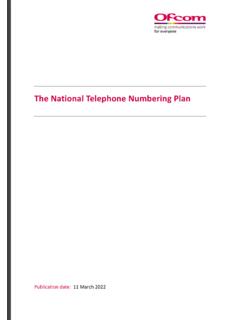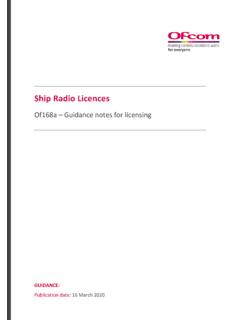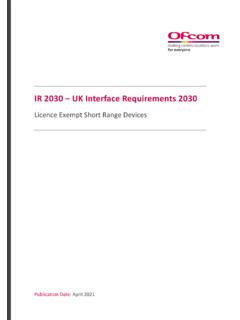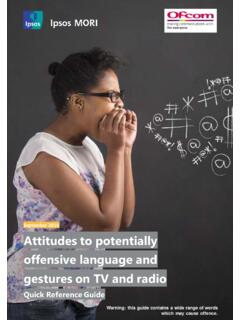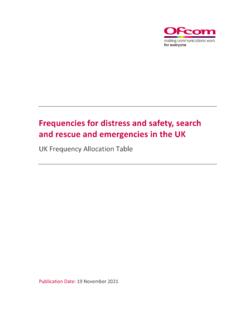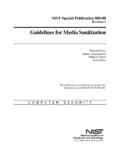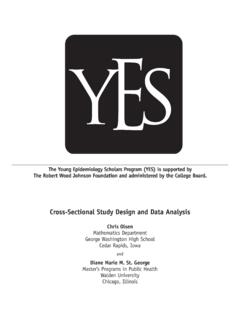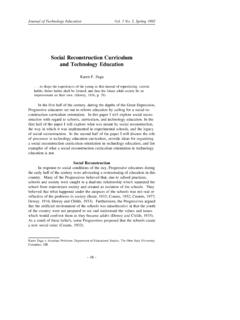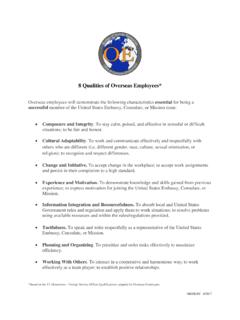Transcription of Ofcom’s approach to
1 Making sense of mediaOfcom s approach to online media literacyPublished 6 December 2021 Gwneud synnwyr r cyfryngauMaking sense of mediaMaking sense of mediaGwneud synnwyr rcyfryngauGwneud synnwyr rcyfryngauWelsh version available: Ymagwedd Ofcom at ymwybyddiaeth o r cyfryngau ar-leinOfcom s approach to online media literacy 2 Contents Executive 3 Introduction .. 5 Ofcom s approach to improving media literacy among online users .. 8 Engage .. 11 Initiate .. 14 Establish .. 16 Evaluate .. 19 Research .. 23 Next Steps: Summary of Ofcom s activities in the next 12 months .. 27 Ofcom s approach to online media literacy 3 Executive Summary Being able to participate effectively online has never been more important.
2 The last two years have taught us of the power of online connection to keep scattered families and friends together, to educate and entertain our children when schools were closed and to enable many adults to work remotely as the nation locked down. From family workouts to heart-felt video calls with elderly family members in care homes, access to technology and the ability to use it was fundamental to our wellbeing in lockdown. For many the absence of being able to engage in this way was also clearly felt. Ofcom has a mission to make communications work for everyone, both in traditional and online technologies.
3 That means we must consider how everyone can benefit from all that being online has to offer, safely. It means addressing the imbalance of skills and knowledge among different parts of the population and encouraging platforms to make it as easy as possible for people to understand and use their services safely and effectively. The lockdowns accelerated a trend of ubiquitous internet use, which is here to stay. Alongside all the benefits that brings, there are three primary policy challenges which we will address. media Literacy is fundamental to inclusion: Being online is hugely powerful we need to support those not currently online and those only online in a limited way (for example, only using a small number of services, or only online on a smartphone) so that we can all enjoy those benefits.
4 Were we not to do so, there is a risk that a digitally excluded underclass would emerge, which helps no-one. Apps and platforms are created for our communication, information and entertainment, not to dominate who we are and determine who gets to participate in society. media Literacy is fundamental for people being able to live safe and savvy lives online: We all need to have the ability to and get into the habit of critically assessing what we see online, so that we can recognise the sources of information and content we are receiving, and judge whether we trust it. We will all encounter potentially risky or harmful content or contact at some point while online.
5 media literacy allows us to build resilience online when we stumble across harms and to take appropriate action to identify and protect ourselves and others. media Literacy is as much about what platforms and services do as it is what users do: People s ability to understand and control what they see and do online is determined both by their own skills and the design of the services that they use. Safe and effective participation is more likely when platforms design their environments as places where media literacy is intentionally supported. Ofcom s approach to online media literacy 4 Promoting media literacy is a key tool in our primary duty to further the interests of citizens and consumers and will be critical to our future functions as the online safety regulator.
6 We are re-launching our online media literacy programme, using our existing powers, with the goal of promoting people's ability to participate effectively and stay safe online. We are organising our programme of work under the following five pillars: Engage - There is an online media literacy sector across the UK that is already undertaking a substantial amount of work. We will make a material contribution to this sector, rather than replicating what others are already doing. Initiate - We will support the sector by commissioning initiatives to serve specific cohorts in communities recognised as having particular media literacy needs.
7 Confidence, competence and critical thinking online are unevenly spread across the population and it s often those that need those skills and behaviours most that are the least well served. Establish - We will seek to establish best practice design principles for media literacy. Our statutory duty to promote media literacy enables us to encourage platforms to look at how their design affects what their users see. Also, to work around enabling users to control what they see. We are keen to develop this work into best-practice principles, which will inform our thinking about our future online safety duties.
8 Evaluate - Throughout the UK, media literacy programmes are often delivered by third sector organisations working to tight timescales and budgets. To enhance the effectiveness of that work, Ofcom will produce guidance on how to evaluate it and curate an evidence base on what works. Research - We will continue to provide a solid and innovative evidence base to inform our work and that of the broader media literacy sector. We will continue to work with other media literacy research experts to develop and share methodologies and metrics. This document details our priorities across these five pillars and serves as an invitation to participate in this work.
9 Ofcom s approach to online media literacy 5 Introduction Our Making Sense of media (MSOM) programme was designed to focus on online media literacy, and this document sets out our approach . We also explain how Ofcom s work on media literacy fits alongside our developing online regulatory role. We recognise that media literacy is not solely relevant to the online environment. There are other media that it encompasses, such as broadcasting and telecoms. However, online issues have been a major focus of attention in recent years, and are likely to remain so, given how integral online activity is to so much of our daily lives.
10 What is media literacy? The pandemic and the associated lockdowns made the ability to participate online more important than ever. Perhaps for the first time, that sudden change to life as we knew it provided a reason for some of us to learn how to video call, arrange a food delivery, order clothes and books, find health information and experience entertainment online. Some people learnt to play a musical instrument, speak a new language, started a job, performed online or participated in virtual pub quizzes. We had to decide what information to trust and share on our social feeds, and work out who and what to believe and who and what to ignore.
